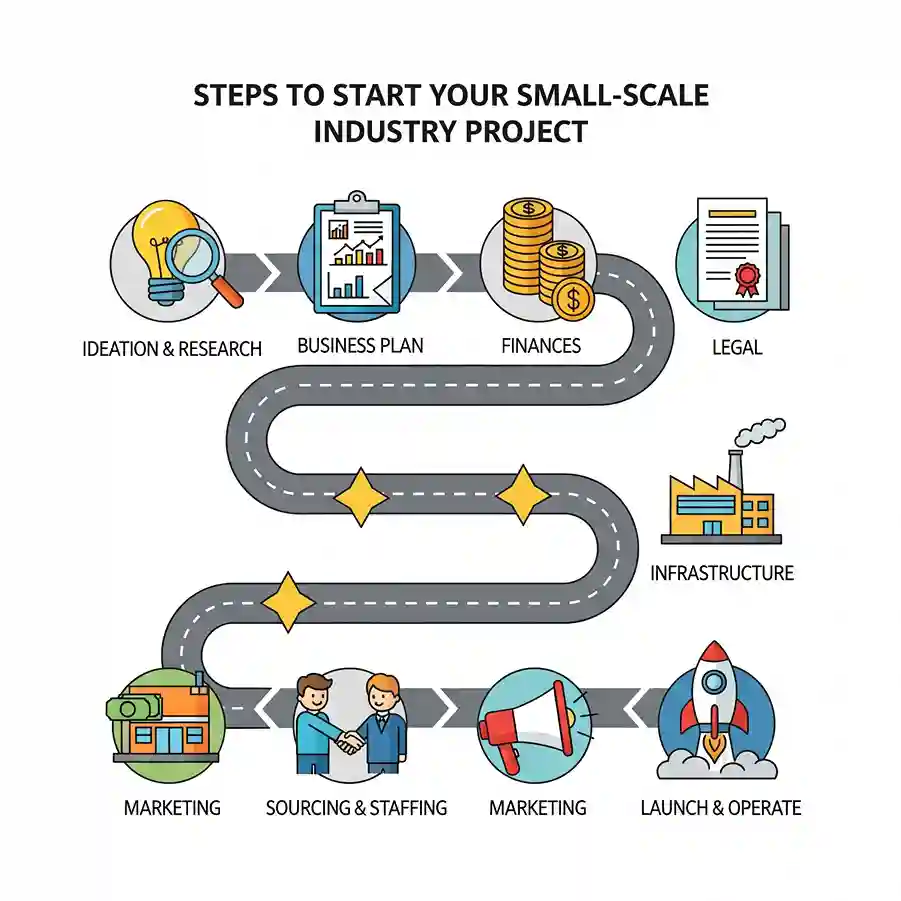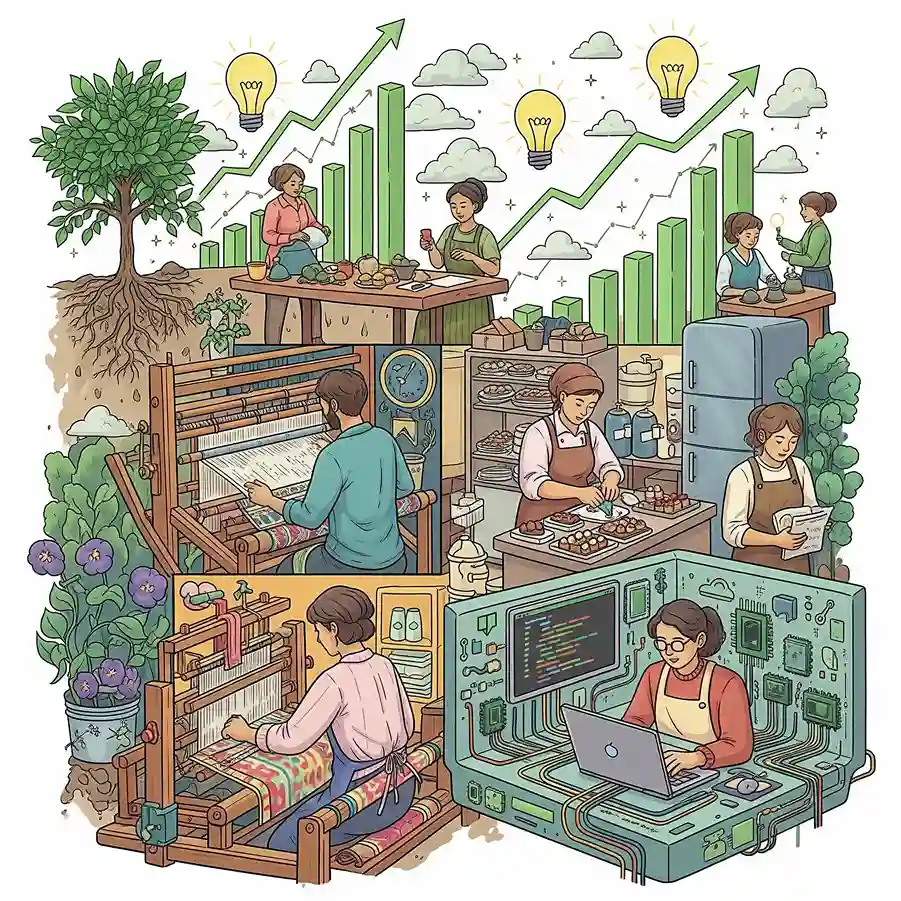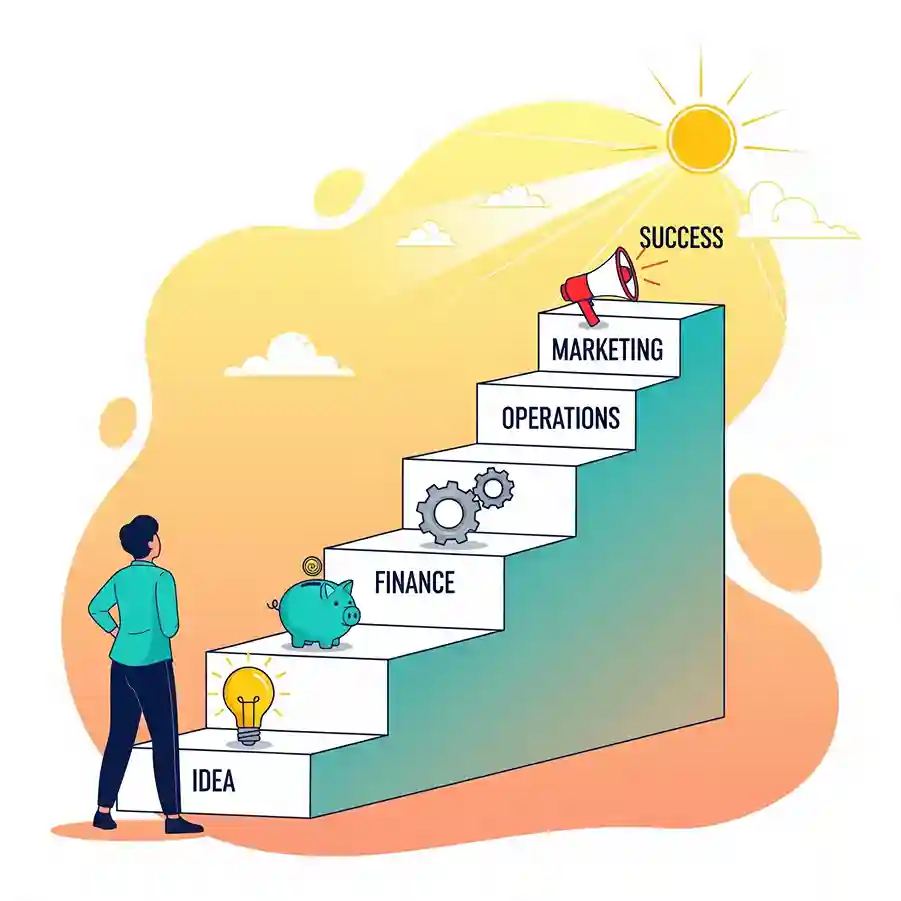Small-scale industries are a vital part of any growing economy. They provide a powerful engine for economic growth, job creation, and balanced regional developments. These industries are characterized by lower capital investments, operational flexibility and labor-intensiveness. They provide a fertile environment for entrepreneurs to thrive. The spectrum of small projects is wide and diverse, ranging from traditional handicrafts up to modern tech-based service. An SSI can be a rewarding experience, transforming a simple business idea into a profitable and sustainable venture that will contribute to individual prosperity as well as national progress.
This article provides a guide to aspiring entrepreneurs on how to start small-scale projects in the industry. We will examine a variety of project ideas in various industries, outline the steps to setting up a venture, discuss support systems, and address common challenges along the way.

Understanding Small-Scale Industries
The definition can vary by country, but it is generally based on the investment in plant and machinery. It can vary from country to country, but is usually based on investment in machinery and plant.
Key Characteristics Of SSIs
- Low capital investment: These industries require much less money to invest in land, buildings, and machinery than large-scale industries.
- Labor-Intensive: The SSIs provide a large number of jobs, and they often use manual labor rather than heavy automation. This is important in countries with a surplus of labor.
- Use Local Resources: These countries tend to use locally available raw materials, and they also employ indigenous skills. This helps reduce costs and promote regional self-sufficiency.
- Flexibility: Due to their smaller size, they are able to quickly adapt to changes in the market, customer preferences and technology.
- Decentralized development: They are set up in semi-urban and rural areas and help to disperse industrial activity.
Read More: Profitable Small Businesses in West Bengal: Top 15 Ideas
Small-scale Industry Project Ideas
The first and most important step is to choose the right project. The perfect project will align with your interests, skills, market demand and capital. Here are some project ideas that you can consider, categorized by industry:
Food and Beverage Sector
Food industry continues to grow because demand is always constant. Innovation is often a key factor in bringing high profits to this sector.
- Confectionery and Bakery: Classic SSI Project. Start with a small bakery or confectionery that sells bread, cookies, cakes and pastries.
- Spice Powder Making: India, the spice bowl of world. It can be lucrative to set up a small business that produces and packages high-quality spice powders, such as turmeric, coriander, and chili.
- Pickle Production: Homemade jams and pickles are a popular product, both in the United States and abroad.
- Organic Food Store: As health awareness grows, so does the demand for organic foods, including fruits, vegetables and grains. A curated selection and sourcing from local organic farms can help you build a loyal customer base.
Read Our Book: Profitable Small Scale Industries – Money Making Business Ideas for Startup
Textile and Apparel Sector
Fashion and textiles offer endless creative and entrepreneurial opportunities.
- Customized T-Shirt Printing: It is a high-demand, low-investment business. You can serve corporate clients, event planners and individual customers with a quality heat press machine.
- Garment Production: A profitable business can be found by focusing on a niche such as children’s clothing, ethnic wear like sarees and kurtis, or uniforms for businesses and schools.
- Jute bag manufacturing: With the growing environmental awareness, demand for eco-friendly alternative to plastic bags is on the rise. Jute bags are stylish, durable, and biodegradable. Sustainable business ideas include manufacturing jute bags of all types, including shopping bags, tote bag, and promotional bags.
Personal Care and Cosmetics Sector
This sector has seen a number of opportunities arise as consumers shift to natural products and chemicals-free alternatives.
- Making Handmade Soaps: You can make soaps at home using natural ingredients such as essential oils, herbs and goat’s milk.
- Herbal Oil Production: Formulating herbal hair oils with traditional ingredients such as amla, bhringraj and hibiscus, can appeal to a market that is looking for natural hair solutions.
- Organic Cosmetics: A line of organic cosmetics such as face packs and scrubs can be highly profitable.
Manufacturing and Engineering Sector
These projects may require more technical expertise, but they can be very rewarding.
- Paper Bags and Paper Cups Manufacturing: As plastics are banned in many areas, demand for alternatives based on paper is at an all time high. A semi-automated or automated unit can prove to be a very profitable venture.
- Assembly of LED Bulb: The LED light is more energy efficient and has replaced the traditional bulb. A unit of assembly is used to source components and assemble them into finished LED lamps. The market is further boosted by government initiatives that promote LED use.
- Furniture Manufacturing: A small furniture company can concentrate on creating custom-made furniture, using innovative materials or quality wood, instead of competing with large-scale manufacturers.

How to start a small-scale industry project
Planning and executing an SSI is essential. A structured approach will increase your success rate.
Read Our Project Report: Projects on Small Scale Industries (projects with low investment)
- Market Research and Ideation: Develop a business concept based on passion and expertise. Market research is essential to determining the market demand, identifying your target audience, analyzing competitors and assessing the viability of the project.
- Create an Detailed Business Plan: Your roadmap is a detailed business plan. This plan should include the mission and vision of your company, product/service details and market analysis. It will also contain a marketing and sales strategy and an operational plan.
- Finances: Calculate the total capital needed. Explore different funding options.
- Personal savings (Bootstrapping): Use your own funds.
- Business Loans: Contact banks to obtain business loans. Government schemes can often help.
- Government Schemes: Check out schemes such as the MUDRA Yojana in India or PMEGP, which provides financial assistance to small business.
- Compliance with Legal and Regulatory Law:
- Business structure: Decide if you want to be a private limited company, a partnership or a sole proprietorship.
- Registration: Register Your Business. It is beneficial to obtain an MSME Registration in India (formerly Udyam Registration).
- Permits and Licenses: Obtain all the necessary permits, including a trade licence, GST registration, FSSAI (for food products), as well as any environmental clearances that may be required.
- Install Infrastructure:
- Location: Select a location that is suitable based on the proximity of raw materials, access to markets, and availability labor.
- Equipment and Machinery: Invest in high-quality machines to meet your production requirements.
- Sourcing & Staffing:
- Raw Material: Find reliable suppliers of your raw materials for consistent quality and timely deliveries.
- Hiring: Hire skilled and semi-skilled workers according to your operational needs.
- Sales and Marketing: Create a strong brand image. To reach your target audience, use a combination of traditional and digital strategies, such as social media marketing, content-marketing, and local advertising. Create distribution channels to bring your product to market.
- Launch and Operate: Start production, launch your service or product, and concentrate on smooth operations.
Read More: 43 Lucrative Manufacturing Business Opportunities for Modern Entrepreneurs
Small-Scale Industries: Challenges and Opportunities
Entrepreneurs in the SSI industry face many challenges, despite the vast opportunities.
- Access To Finance: Obtaining timely and adequate financing remains a major obstacle for many small business.
- Competition: The SSIs are in a fierce competition with large multinational and domestic corporations who benefit from economies scale.
- Technological Obsolescence: Upgrading machinery and keeping up with the latest technologies can be expensive.
- Marketing & Distribution: Limited resource often limits their ability to effectively market their products and build wide distribution networks.
- The Regulatory Obstacles: New entrepreneurs can find it difficult to navigate the complex requirements of regulatory agencies and paperwork.
Discover the Right Business for You With Our Startup Selector Tool
Conclusion
Small-scale industries can be a powerful catalyst for encouraging entrepreneurship, employment and inclusive economic growth. Anyone can start a successful small business with a good idea, a solid business plan, commitment, and the ability adapt to changing markets. This is the ideal time to make your entrepreneurial dreams a reality. The wide range of project options, combined with increased government support and an enabling economic climate, are all factors that contribute. You can contribute to the larger narrative of innovation, self-reliance and sustainable development by starting small.
Small Scale Industries: Frequently Asked Questions (FAQs)
Q2. What is a small-scale industry in India?
It’s pretty simple. If your business has spent less than ₹10 crore on machines or tools, and your yearly sales are under ₹50 crore, it’s called a small enterprise in India. This rule started in July 2020.
Q2. How much money do you need to start?
It depends on what you want to do. If you want to make soap at home, you can start with just ₹20,000 to ₹50,000. But if you want to open a small factory, like for paper bags, you might need ₹5 lakh to ₹10 lakh or more for the machines and setup. So, the cost changes a lot depending on your plan.
Q3. Why should you register as an MSME?
Honestly, it helps a lot. Banks may give you loans with less interest. You can get government help and special schemes. The government also gives MSMEs a better chance in tenders. You might get some tax benefits, and if someone doesn’t pay you on time, the law protects you. It’s worth doing if you’re serious.
Q4. Can you start a small business from home?
Yes, lots of people do this. You can bake, make crafts, design t-shirts, write, or even code—all from home. This way, you don’t have to spend money on rent. It’s a smart way to start.
Q5. What is the most profitable small business?
There isn’t just one answer. It depends on what people want, where you live, how you run your business, and your skills. Things people always need, like food or daily use products, often make good money. Eco-friendly or organic stuff is popular now too. The best thing is to check what people want in your area before you start.









